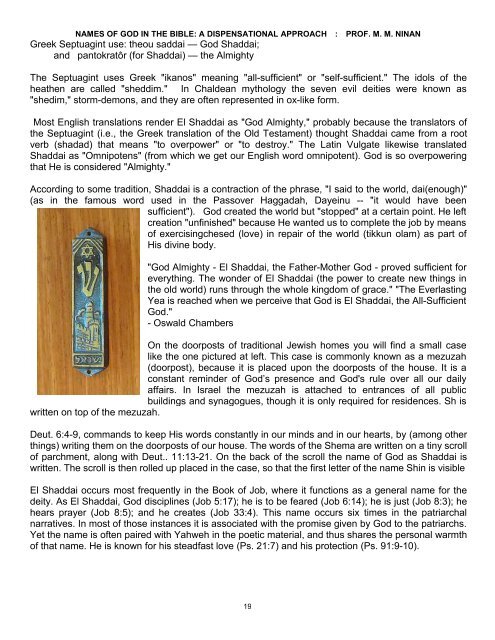THE NAMES OF GOD
You also want an ePaper? Increase the reach of your titles
YUMPU automatically turns print PDFs into web optimized ePapers that Google loves.
<strong>NAMES</strong> <strong>OF</strong> <strong>GOD</strong> IN <strong>THE</strong> BIBLE: A DISPENSATIONAL APPROACH : PR<strong>OF</strong>. M. M. NINAN<br />
Greek Septuagint use: theou saddai — God Shaddai;<br />
and pantokratôr (for Shaddai) — the Almighty<br />
The Septuagint uses Greek "ikanos" meaning "all-sufficient" or "self-sufficient." The idols of the<br />
heathen are called "sheddim." In Chaldean mythology the seven evil deities were known as<br />
"shedim," storm-demons, and they are often represented in ox-like form.<br />
Most English translations render El Shaddai as "God Almighty," probably because the translators of<br />
the Septuagint (i.e., the Greek translation of the Old Testament) thought Shaddai came from a root<br />
verb (shadad) that means "to overpower" or "to destroy." The Latin Vulgate likewise translated<br />
Shaddai as "Omnipotens" (from which we get our English word omnipotent). God is so overpowering<br />
that He is considered "Almighty."<br />
According to some tradition, Shaddai is a contraction of the phrase, "I said to the world, dai(enough)"<br />
(as in the famous word used in the Passover Haggadah, Dayeinu -- "it would have been<br />
sufficient"). God created the world but "stopped" at a certain point. He left<br />
creation "unfinished" because He wanted us to complete the job by means<br />
of exercisingchesed (love) in repair of the world (tikkun olam) as part of<br />
His divine body.<br />
"God Almighty - El Shaddai, the Father-Mother God - proved sufficient for<br />
everything. The wonder of El Shaddai (the power to create new things in<br />
the old world) runs through the whole kingdom of grace." "The Everlasting<br />
Yea is reached when we perceive that God is El Shaddai, the All-Sufficient<br />
God."<br />
- Oswald Chambers<br />
On the doorposts of traditional Jewish homes you will find a small case<br />
like the one pictured at left. This case is commonly known as a mezuzah<br />
(doorpost), because it is placed upon the doorposts of the house. It is a<br />
constant reminder of God’s presence and God's rule over all our daily<br />
affairs. In Israel the mezuzah is attached to entrances of all public<br />
buildings and synagogues, though it is only required for residences. Sh is<br />
written on top of the mezuzah.<br />
Deut. 6:4-9, commands to keep His words constantly in our minds and in our hearts, by (among other<br />
things) writing them on the doorposts of our house. The words of the Shema are written on a tiny scroll<br />
of parchment, along with Deut.. 11:13-21. On the back of the scroll the name of God as Shaddai is<br />
written. The scroll is then rolled up placed in the case, so that the first letter of the name Shin is visible<br />
El Shaddai occurs most frequently in the Book of Job, where it functions as a general name for the<br />
deity. As El Shaddai, God disciplines (Job 5:17); he is to be feared (Job 6:14); he is just (Job 8:3); he<br />
hears prayer (Job 8:5); and he creates (Job 33:4). This name occurs six times in the patriarchal<br />
narratives. In most of those instances it is associated with the promise given by God to the patriarchs.<br />
Yet the name is often paired with Yahweh in the poetic material, and thus shares the personal warmth<br />
of that name. He is known for his steadfast love (Ps. 21:7) and his protection (Ps. 91:9-10).<br />
19


















